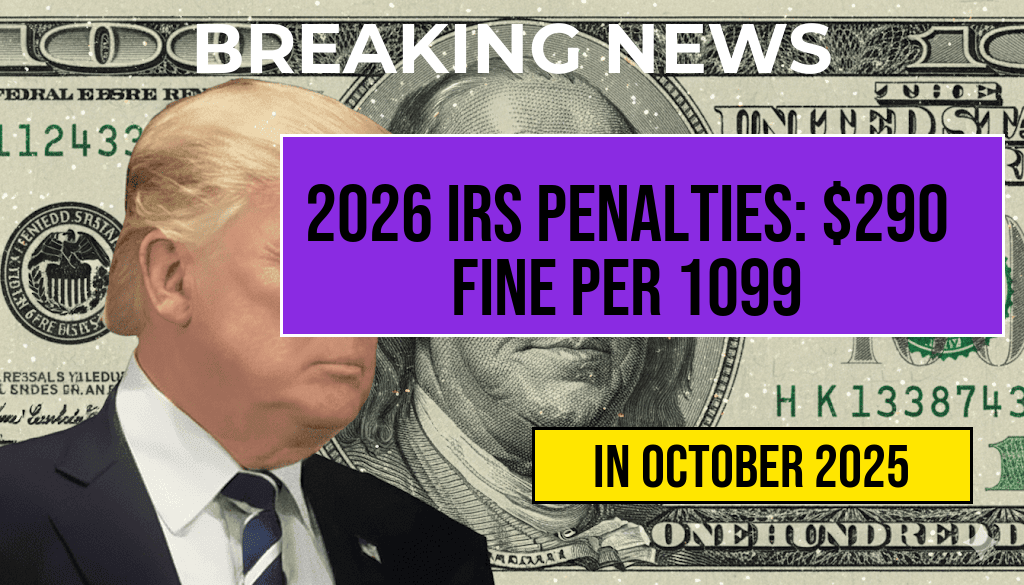Understanding the 2026 IRS Penalties for Missing 1099 Forms
The Internal Revenue Service (IRS) has announced heightened penalties for failing to file or furnish 1099 forms accurately and on time, set to take effect in 2026. Businesses and individuals responsible for reporting payments made to independent contractors, freelancers, and vendors should be aware that missing a 1099 form can now result in a fine of up to $290 per form. With the IRS intensifying enforcement efforts and increasing penalties, taxpayers must ensure compliance to avoid significant financial penalties. This development underscores the importance of meticulous record-keeping and timely submissions, especially as the IRS prepares for a new wave of audits and enforcement actions.
Details of the Penalty Structure
Starting from the 2026 tax year, the IRS will impose penalties for each 1099 form that is either not filed or furnished correctly. The penalty amount is set at $290 per form, with a maximum cap that varies depending on how late the filing is and whether the failure is deemed intentional. The IRS emphasizes that these penalties aim to encourage timely and accurate reporting, which is crucial for closing the tax gap and ensuring proper revenue collection.
Scope of the Penalties
The penalties apply to several types of 1099 forms, most notably the 1099-NEC (used to report nonemployee compensation) and 1099-MISC (used for miscellaneous income). Businesses must file these forms if they have paid $600 or more to a contractor or vendor during a calendar year. Failure to do so can lead to penalties, but the IRS also considers circumstances such as missing forms due to errors or delays.
Penalty Tiers and Enforcement
| Timing of Filing | Penalty per Form | Maximum Penalty | Notes |
|---|---|---|---|
| Filed within the deadline | $290 | Varies (see below) | Unintentional errors may incur lower penalties; intentional disregard leads to higher penalties |
| Filed more than 30 days late | $290 | Limited by overall penalty caps | Penalty increases if failure persists beyond the deadline |
| Filed after August 1 | $290 | Limited by overall penalty caps | Late filings attract maximum penalties |
The IRS has also clarified that intentional disregard of filing requirements can lead to penalties exceeding the standard amount, potentially reaching the statutory maximum, which is adjusted periodically.
Implications for Taxpayers and Businesses
The increased penalties signal a push for stricter compliance and proactive record-keeping. Businesses that fail to file or furnish 1099s risk substantial fines, which can impact cash flows and tax planning strategies. The IRS has been investing in enhanced data matching and audit capabilities, making it more critical than ever to adhere to reporting obligations.
Tax professionals recommend establishing robust internal controls to track payments, verify vendor information, and meet filing deadlines. Additionally, businesses should review their current processes for collecting W-9 forms from vendors and contractors to ensure accurate taxpayer identification numbers (TINs) and addresses, which are essential for avoiding penalties.
Strategies to Minimize Penalties
- Early preparation: Gather all payment records and W-9 forms well before the filing deadline.
- Use electronic filing: The IRS encourages electronic submissions, which tend to be processed faster and with fewer errors.
- Verify information: Cross-check TINs and addresses to prevent mismatches that could trigger penalties.
- Seek professional advice: Consult with tax experts for guidance on complex reporting scenarios and penalty mitigation strategies.
The IRS also provides resources and guidance on its [official website](https://www.irs.gov/businesses/filing-information-returns-electronically) to assist filers in meeting their obligations.
Looking Ahead: Legislative and Policy Changes
While the $290 penalty per form is set for 2026, ongoing legislative discussions could influence future enforcement policies. Advocates argue that the increased penalties will promote better compliance, while critics warn that they could impose undue hardship on small businesses. As the IRS continues to modernize its systems, taxpayers should anticipate further updates and clarifications to reporting rules.
For anyone handling business payments or independent contractor payments, understanding these upcoming penalties and implementing proactive measures can prevent costly mistakes. Staying informed through trusted sources such as the [IRS](https://www.irs.gov/) and reputable tax advisors remains the best approach to navigating these changes effectively.
Additional Resources
Frequently Asked Questions
What is the penalty for missing a 1099 form in 2026?
The IRS can impose a $290 fine per missing 1099 form in 2026. This penalty applies to both failure to file and failure to provide the form to the recipient.
Who is affected by the 2026 IRS penalties for 1099 forms?
Businesses and payers who are required to file 1099 forms for payments made to independent contractors, freelancers, or other payees are affected by these penalties if they fail to file or furnish the forms correctly.
Are there any exceptions or waivers for the 1099 filing penalties?
Yes, the IRS may waive penalties if the failure to file was due to reasonable cause and not due to willful neglect. However, taxpayers must provide a valid explanation and comply with specific procedures to qualify for a waiver.
What are the key deadlines for filing 1099 forms in 2026?
The deadline for furnishing 1099 forms to recipients is typically January 31, while the deadline for filing with the IRS is February 28 for paper filings or March 31 for electronic filings. Accurate and timely filing is essential to avoid penalties.
How can businesses avoid penalties related to 1099 forms?
Businesses can avoid penalties by maintaining accurate records, filing 1099 forms on time, using electronic filing when possible, and verifying recipient information carefully before submission.

Leave a Reply